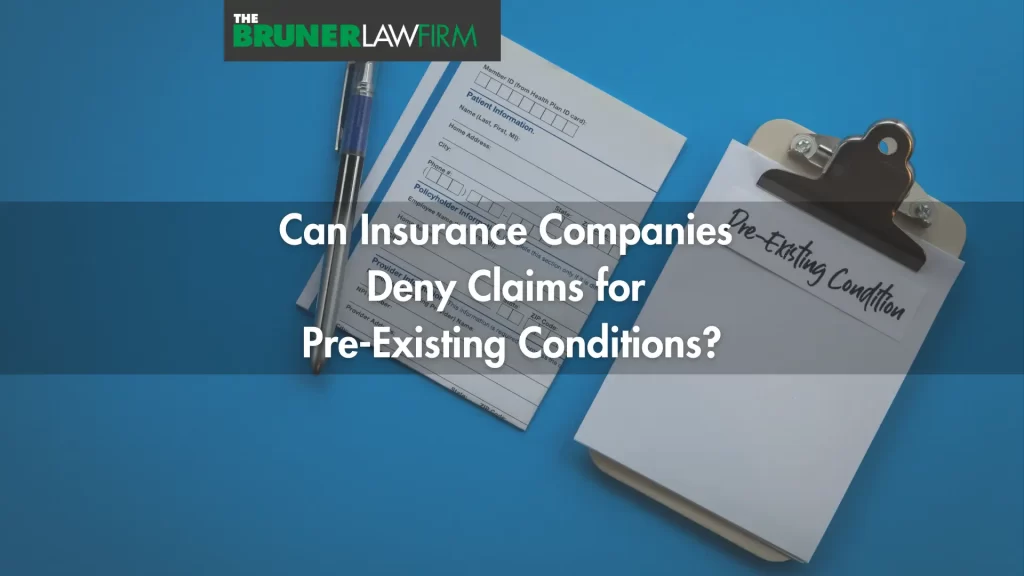
When insurance companies refuse to pay a claim for a pre-existing condition, it feels like a punch in the gut. You’ve paid your premiums, you’re hurt, and you need help — but instead, you’ve been turned down because of a health condition that existed before the accident.
Insurance companies frequently use the pre-existing condition argument to deny people compensation after an accident, even when that argument doesn’t hold water. While it’s true that insurance companies can deny accident claims for pre-existing conditions, they sometimes stretch the definition of a pre-existing condition or won’t pay up when an accident aggravates a prior injury. If this happened to you, it’s time to call an attorney. The Fort Walton Beach personal injury lawyers at The Bruner Law Firm have helped many people like you battle insurance companies, and this blog explains when an insurer can or can’t deny a claim based on a pre-existing condition.
What Is a Pre-Existing Condition?
In simple terms, a pre-existing condition is any health issue you have before your insurance coverage starts. This could be something major like diabetes or heart disease or something minor like an old ankle sprain.
It’s important to remember that having a pre-existing condition doesn’t mean that you’re uninsurable or that every claim will automatically be denied. But it can certainly make things more complicated when you’re trying to file a claim, especially after a personal injury.
Can I Recover Compensation for a Pre-Existing Condition?
In the world of personal injury law, there’s a principle known as the “eggshell plaintiff” rule. This rule essentially states anyone injuring another person is responsible for all the consequences, even if the person had a pre-existing condition that worsened the injuries. Sounds fair, right?
In theory, this should mean pre-existing conditions shouldn’t impact your right to compensation following an accident. But in reality, it’s not always that straightforward.
Insurance companies are businesses; like all businesses, they’re trying to minimize costs. Sometimes, they might argue that your injury resulted from a pre-existing condition rather than the accident. And in those cases, they might attempt to deny your claim or reduce the amount they have to pay. But remember, just because an insurance company says something doesn’t mean it’s the final word.
How to Prove Your Injury Wasn’t a Pre-Existing Condition
 If your claim gets denied due to a pre-existing condition, it might feel like you’ve hit a brick wall. But don’t worry; you can take steps to challenge the insurance company’s decision. It begins by demonstrating that a pre-existing condition did not cause your injury but is a result of the accident. Here’s how you can do that:
If your claim gets denied due to a pre-existing condition, it might feel like you’ve hit a brick wall. But don’t worry; you can take steps to challenge the insurance company’s decision. It begins by demonstrating that a pre-existing condition did not cause your injury but is a result of the accident. Here’s how you can do that:
- Medical Records: Your medical records are your most powerful tool to push back against an insurance company’s ruling. These records can show the state of your health before and after the accident. If your records indicate that your condition worsened significantly after the accident, they can serve as strong evidence that the injury resulted from the accident, not the pre-existing condition.
- Doctor’s Opinion: A doctor or medical expert can provide a professional opinion on whether the accident could have caused or aggravated your injury.
- Accident Reports: If there were witnesses to your accident or if there’s a police report, these can also help establish the cause of your injury. If the reports indicate you were injured in the accident, this can support your claim.
- Timeline: Showing a timeline of your medical treatment can also be helpful. If you sought medical attention immediately after your accident, it can help link your injury to the incident.
What If an Accident Aggravated My Pre-Existing Condition?
If an accident worsens your existing condition, it’s likely you can still recover compensation. This is a continuation of the “eggshell plaintiff” rule we discussed earlier.
Just like an eggshell is more fragile and likely to crack, some people might be more susceptible to injury. But the law acknowledges this and, as a result, you shouldn’t be penalized because you had a pre-existing condition that made you more vulnerable to injury.
Suppose you had a previous back injury that hadn’t bothered you for years. Then, because of a car accident, you’re suddenly dealing with terrible back pain again. This is an example of an accident aggravating a pre-existing condition. Even though your back wasn’t in perfect shape beforehand, the accident made it worse, and the at-fault party could be responsible for that.
It’s crucial, however, to prove that the accident aggravated your pre-existing condition, which goes back to having good medical documentation, expert opinions, and a detailed timeline of your symptoms and treatments.
While insurance companies technically can deny claims for pre-existing conditions, they frequently exploit this loophole for their own gain and to deny people the money they need. If an insurance company won’t pay your claim because of a pre-existing condition, call (850) 243-2222 or fill out our contact form to speak with one of our attorneys.
Related Posts:







